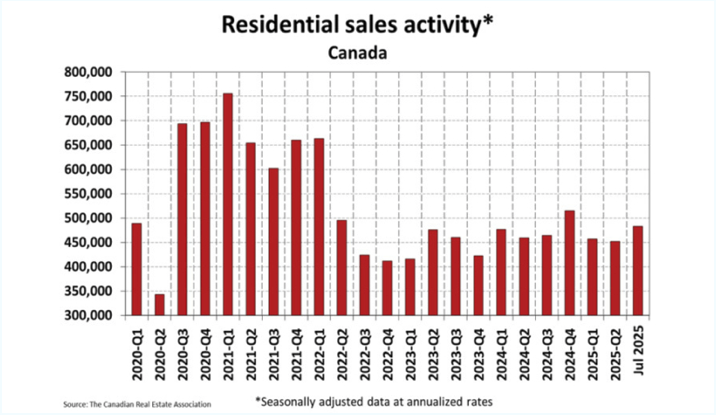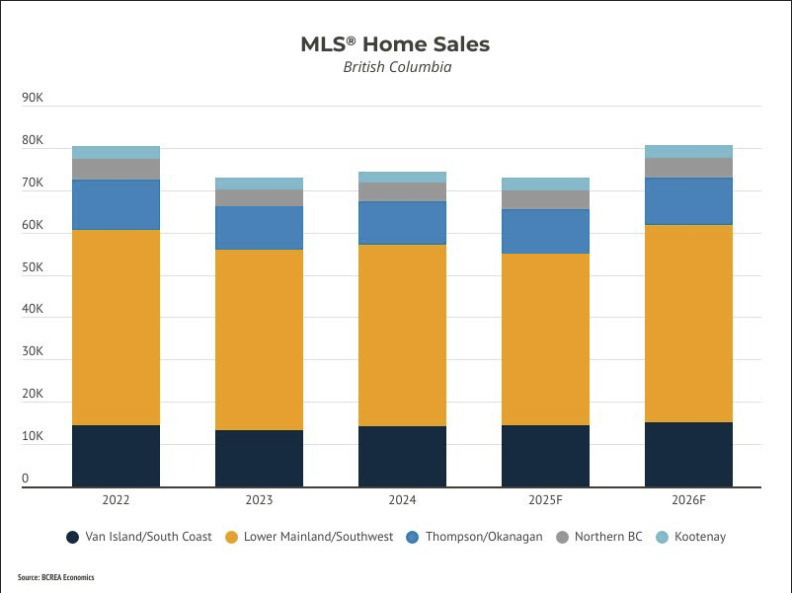Posted on
August 16, 2025
by
Fazi Real Estate
Sales recovery continues in July
Home sales registered on the MLS® across Metro Vancouver in July extended the early signs of recovery that emerged in June, now down just two per cent from July of last year.
The Greater Vancouver REALTORS® (GVR) reports that residential sales in the region totalled 2,286 in July 2025, a two per cent decrease from the 2,333 sales recorded in July 2024. This was 13.9 per cent below the 10-year seasonal average (2,656).
“The June data showed early signs of sales activity in the region turning a corner, and these latest figures for July are confirming this emerging trend,” said Andrew Lis, GVR’s director of economics and data analytics. “Although the Bank of Canada held the policy rate steady in July, this decision could help bolster sales activity by providing more certainty surrounding borrowing costs at a time where economic uncertainty lingers due to ongoing trade negotiations with the USA.”
There were 5,642 detached, attached and apartment properties newly listed for sale on the Multiple Listing Service® (MLS®) in Metro Vancouver in July 2025. This represents a 0.8 per cent increase compared to the 5,597 properties listed in July 2024. This was 12.4 per cent above the 10-year seasonal average (5,018).
The total number of properties currently listed for sale on the MLS® system in Metro Vancouver is 17,168, a 19.8 per cent increase compared to July 2024 (14,326). This is 40.2 per cent above the 10-year seasonal average (12,249).
Across all detached, attached and apartment property types, the sales-to-active listings ratio for July 2025 is 13.8 per cent. By property type, the ratio is 10.2 per cent for detached homes, 16.7 per cent for attached, and 15.9 per cent for apartments.
Analysis of the historical data suggests downward pressure on home prices occurs when the ratio dips below 12 per cent for a sustained period, while home prices often experience upward pressure when it surpasses 20 per cent over several months.
“With the rate of homes coming to market holding steady in July, the inventory of homes available for sale on the MLS® has stabilized at around 17,000. This level of inventory provides buyers plenty of selection to choose from,” Lis said. “Although sales activity is now recovering, this healthy level of inventory is sufficient to keep home prices trending sideways over the short term as supply and demand remain relatively balanced. However, if the recovery in sales activity accelerates, these favorable conditions for home buyers may begin slowly slipping away, as inventory levels decline, and home sellers gain more bargaining power.”
The MLS® Home Price Index composite benchmark price for all residential properties in Metro Vancouver is currently $1,165,300. This represents a 2.7 per cent decrease over July 2024 and a 0.7 per cent decrease compared to June 2025.
Sales of detached homes in July 2025 reached 660, a 4.1 per cent decrease from the 688 detached sales recorded in July 2024. The benchmark price for a detached home is $1,974,400. This represents a 3.6 per cent decrease from July 2024 and a 1 per cent decrease compared to June 2025.
Sales of apartment homes reached 1,158 in July 2025, a 2.9 per cent decrease compared to the 1,192 sales in July 2024. The benchmark price of an apartment home is $743,700. This represents a 3.2 per cent decrease from July 2024 and a 0.6 per cent decrease compared to June 2025.
Attached home sales in July 2025 totalled 459, a five per cent increase compared to the 437 sales in July 2024. The benchmark price of a townhouse is $1,099,200. This represents a 2.3 per cent decrease from July 2024 and a 0.4 per cent decrease compared to June 2025.
To read the news release click here.
To visit BCREA's YouTube channel click here click here.
Disclaimer: The Housing Market Update video is produced monthly by the British Columbia Real Estate Association. Copyright British Columbia Real Estate Association. Reprinted with permission." BCREA makes no guarantees as to the accuracy or completeness of this information.
Additional economics information is available here on BCREA's website.









